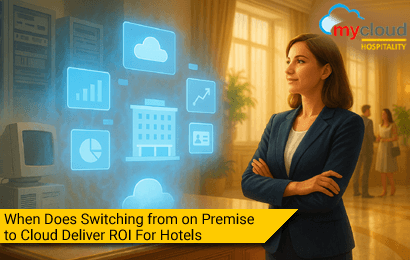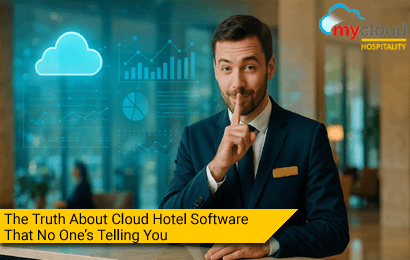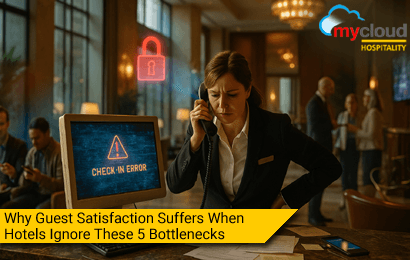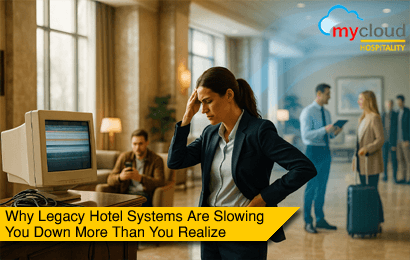In hospitality, every second can mean the difference between delighting a guest and disappointing one. Quick check-ins, real-time billing, and instant service updates define modern guest experiences. Yet behind this speed lies a crucial question for every hotelier: Is your Property Management System saving you time—or stealing it?
In 2025, the conversation around efficiency is sharper than ever: Cloud vs On-Premise Hotel PMS—who truly wins the race against time?
According to Hotel Tech Report (2024), over 65% of global hotels have already migrated to cloud-based PMS platforms to cut down manual tasks and reclaim staff hours lost to outdated systems.
Let’s dive into why time-efficiency isn’t just an operational goal—it’s now the heartbeat of hospitality.
The Role of PMS in Transforming Hotel Operations
Imagine a busy Saturday evening at a mid-size hotel in Jaipur. Guests are checking in for a wedding, the housekeeping team is updating room statuses, and the restaurant is processing dinner bills. Without automation, chaos reigns. But with a Hotel management system, every department moves in sync—front desk updates, room assignments, and billing happen seamlessly in real time.
A recent NRAI hospitality survey (2024) found that Indian hotels using PMS platforms saw guest check-ins 30% faster and staff productivity improve by 25% within just months. For small and boutique hotels in destinations like Coorg and Jaisalmer, automation has replaced manual logs with digital efficiency.
From occupancy tracking to night audits, the PMS turns scattered data into actionable insights—helping teams spend less time chasing numbers and more time engaging guests. Let’s explore how the two models—cloud and on-premise—compare when it comes to saving time and sanity.
Cloud vs On-Premise PMS: Which is Preferable for Daily Operations?
Legacy, on-premise PMS platforms once powered hotel operations, but today they feel like anchors—tied to bulky servers, manual updates, and IT dependency. Staff can only access data on-site, and a single system glitch can disrupt service for hours.
In contrast, cloud based hotel management software works wherever your team does. Whether you’re reviewing occupancy from your smartphone or updating housekeeping from a tablet, everything syncs instantly.
A Statista 2024 study revealed that hotels using cloud PMS saw 40% less downtime and fewer reservation errors by up to 50% compared to on-premise systems. In one real case, a heritage hotel in Rajasthan switched to cloud technology and reduced its reconciliation time from three hours to just thirty minutes daily.
The difference is clear: on-premise systems restrict agility, while cloud PMS powers it.
Why Cloud-Based Hotel Systems Are the Future
Technology isn’t just supporting hospitality—it’s reshaping it. Cloud-based PMS platforms are no longer the future; they’re the present driving the industry forward. Let’s break down the key reasons why.
1. Real-Time Accessibility and Control
- Managers can log in from anywhere—whether at the property, a conference, or on vacation.
- Updates like booking modifications or housekeeping tasks happen instantly across all departments.
- For multi-property groups, data from each hotel is centralized—no more waiting for end-of-day reports.
A 2025 HTNG study found 82% of hotels that switched to cloud based hotel PMS cited “mobility” as their top productivity benefit.
2. Seamless Integrations
- Cloud systems connect effortlessly with POS, accounting tools, payment gateways, and OTAs.
- This eliminates double entries and manual coordination between departments.
- Hotels like boutique resorts in Himachal use cloud PMS to sync reservations directly from OTAs and update room availability in seconds.
3. Low Maintenance, Zero IT Stress
- Cloud PMS eliminates costly servers and IT infrastructure.
- Automatic software updates roll out behind the scenes without operational downtime.
- Hotels save on average 25–30% annually in IT maintenance costs (Source: PwC India, 2024).
4. Scalability and Flexibility
- Adding a new property or seasonal room inventory takes minutes—not weeks.
- System scales automatically as your business grows, ensuring smooth performance even during peak seasons.
With cloud based hotel management software, time once lost to maintenance, reporting, and coordination is now channelled into what matters most—guest experience and revenue growth.
Head-to-Head Comparison: Cloud vs On-Premise
Here’s a practical comparison of both systems and how they affect daily operations in 2025:
A) Setup & Deployment
• On-Premise: Installation takes weeks with physical servers, networking, and IT assistance. Each property setup involves downtime and manual configuration.
• Cloud-Based: Go live in hours with zero hardware. A hotel can start operations the same day, even remotely.
B) Cost Structure
• On-Premise: Heavy upfront capital expenditure plus recurring costs for hardware replacements and license renewals.
• Cloud-Based: Operates on a predictable subscription model with no hidden upgrade charges—ideal for hotels managing seasonal cash flow.
C) Accessibility & Mobility
• On-Premise: Restricted to specific terminals; remote access requires complex VPNs and permissions.
• Cloud-Based: Provides real-time access from any device or location—allowing managers to oversee multiple properties simultaneously.
D) Data Security & Backups
• On-Premise: Data security depends on internal IT teams. Any hardware damage risks permanent data loss.
• Cloud-Based: Security handled by certified providers using encrypted servers and automated backup systems with disaster recovery protocols.
E) Scalability
• On-Premise: Expansion demands new hardware, software licenses, and weeks of configuration.
• Cloud-Based: Instantly scalable—add new modules, rooms, or properties in a few clicks without additional investment.
F) Maintenance & Upgrades
• On-Premise: Software updates cause downtime, and IT teams must manually patch each server.
• Cloud-Based: Updates happen automatically at no extra cost, ensuring systems run with the latest features.
G) Integration Capabilities
• On-Premise: Third-party integrations like POS or Channel Managers require costly customization.
• Cloud-Based: Comes with open APIs and pre-built interfaces—allowing easy connections with over 200+ hospitality tools.
H) Total Cost of Ownership (TCO)
• On-Premise: Long-term ownership involves IT staffing, hardware depreciation, and energy expenses.
• Cloud-Based: Offers significantly lower TCO as everything—maintenance, hosting, and support—is included in the subscription.
According to Skift Research (2025), hotels shifting to cloud PMS report 28% lower operational costs and 40% higher staff efficiency—a clear edge in time and value.
Challenges and Key Considerations Before Switching
While cloud PMS brings immense advantages, hotels must evaluate a few factors before transitioning.
• Internet Dependency: Reliable broadband is critical for cloud performance, especially in remote areas.
• Staff Training: Employees may initially resist new systems; proper onboarding ensures faster adaptation.
• Compliance: Hotels must verify that their provider adheres to India’s DPDP Act and global data privacy laws.
• Balancing Automation and Empathy: While automation accelerates service, human warmth remains the foundation of hospitality.
Forward-thinking hoteliers combine technology’s efficiency with staff empathy—ensuring digital transformation enhances, not replaces, the human touch.
How mycloud PMS Helps Hoteliers
Hotels across India, the Middle East, and the UK are rapidly embracing mycloud PMS—a unified hospitality management platform that brings PMS, POS, Channel Manager, Back Office, Accounting, Material Management, Guest Management, and Business Analytics into one intuitive cloud ecosystem. With 200+ ready integrations and a powerful open API, mycloud simplifies tech infrastructure, eliminates operational silos, and ensures every department—from front desk to finance—runs in sync.
This impact is already visible across award-winning properties.
As Rajesh Devarajan, Managing Partner at Hablis Hotel Chennai, shares:
“We’re truly thrilled by the impact mycloud PMS is having on our operations. Its user-friendly design and remote accessibility have revolutionized the way our team works—making daily management faster, smarter, and more efficient. The seamless integrations and powerful reporting tools give us a 360-degree view of guest behaviour, helping us unlock new opportunities to enhance revenue and personalize the guest journey. It’s an exciting leap forward in our mission to deliver unforgettable hospitality.”
With reliable performance, enterprise-grade security, and real-time insights, mycloud PMS empowers hotels to elevate guest experiences, streamline operations, and accelerate profitability—without complexity or IT burden.
Conclusion: Cloud is the Time-Saving Winner
In the ongoing debate of Cloud vs On-Premise Hotel PMS, one truth stands out—time saved is profit earned. Cloud PMS eliminates manual processes, enhances staff productivity, and ensures hotels are ready for a connected, fast-paced future.
For hotels aiming to operate smarter, not harder, the future is undoubtedly cloud-driven.
mycloud PMS brings all hotel tools together under one smart platform—with over 200+ integrations and zero downtime.
Schedule your free demo or start a 30-day free trial today. Experience how mycloud can transform your hotel’s daily operations in just four hours—and make every second count.
FAQs: Your Questions, Answered
1. Will switching to a cloud PMS disrupt my current operations?
No. Cloud systems are quick to deploy, and migration is seamless—often completed within a day with minimal downtime.
2. How secure is guest data in the cloud?
Extremely secure. Leading providers use encryption, multi-layered firewalls, and global standards like ISO 27001 to ensure full data protection.
3. What happens if the internet goes down?
Systems like mycloud PMS offer offline continuity for billing and check-ins, syncing data once the connection restores.
4. How long will staff take to learn a new PMS?
Most hotel teams become comfortable within days thanks to guided onboarding and intuitive dashboards designed for non-technical users.
5. Why choose mycloud PMS over other systems?
Because it’s more than just software—it’s an ecosystem. With PMS, POS, and Analytics all unified, mycloud saves time, reduces errors, and boosts profitability.










